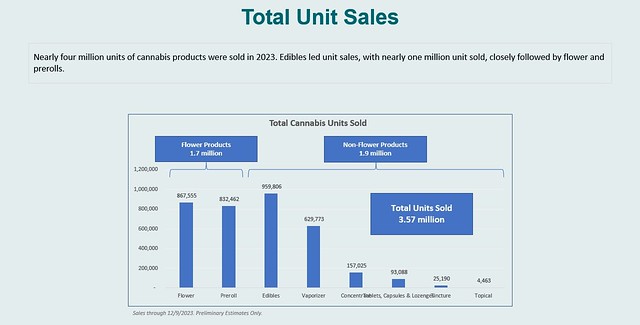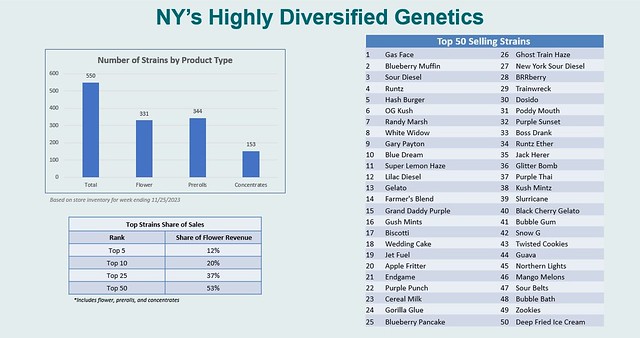Politics
New York Retailers Sold 3.5 Million Marijuana Products In The First Year Of Legalization, State Report Says

New York marijuana regulators published a year-end review of the state’s legal cannabis system on Friday, highlighting major milestones and offering a snapshot of the market almost exactly a year after the state’s first adult-use sales began.
Consumers purchased more than 3.5 million cannabis products during the year, New York State’s Office of Cannabis Management (OCM) said in the report. Once December figures are tallied, total sales for the year are expected to exceed $150 million.
That activity brought in more than $32 million in state revenue, including nearly $16.3 million during fiscal year 2023 and upward of $16.6 million by the midpoint of fiscal 2024.
Despite the nine-figure sales number, the totals are relatively low for a recreational cannabis market in a state with such a sizable population.
New York’s rollout of legal marijuana slowed to a crawl in 2023 amid a court injunction that barred regulators from processing hundreds of new retailer licenses. That created a bottleneck in the market from August until early December, when the state Supreme Court finally lifted the injunction. 2023’s sales figures likely would have been far higher if the launch of the adult-use market had proceeded without the interruption.
Currently, only about 40 licensed adult-use retailers have opened for business across all of New York State, the report says.
In response to the slow retail rollout, regulators launched a temporary Cannabis Growers’ Showcase program, which allowed licensed growers and processors to sell directly to consumers. About 3 percent of total cannabis sales in 2023 occurred through the showcase program.
“We have a lot of work to do, and we have much to be proud of,” Chris Alexander, OCM’s executive director, said in a statement on Friday. “Now that the core market architecture is in place, my team at OCM is ready to scale and help this industry thrive across New York State.”
Of the more than 3.5 million products sold, 46 percent were raw flower or prerolls, while 54 percent were processed, non-flower products. Flower and vape cartridges led the list of individual product types, at 31 percent and 27 percent of total sales, respectively, followed by edibles (17 percent), prerolls (15 percent), concentrate (7 percent), tincture (1 percent), tablets and lozenges (1 percent) and topicals (less than 1 percent).
The state’s first licensed adult-use retailer, Housing Works Cannabis Co., said in a press release on Friday that it saw about $24 million in sales during its first year of operation. The Friday before Memorial Day, the company said, was their strongest day of sales, with more than $100,000 in products sold. The week in September before Labor Day, meanwhile, was the busiest week of sales, bringing in more than half a million dollars.
Explore how #NYcannabis is creating a market that values community and opportunity for every New Yorker. Don’t just take our word for it – the numbers speak for themselves. pic.twitter.com/tuuoOpg5sV
— NYS Office of Cannabis Management (@nys_cannabis) December 27, 2023
“Since opening our doors one year ago, we’ve been operating in somewhat of a pop-up phase, but that hasn’t stopped us from continuing to push our mission forward,” Sasha Nutgent, retail manager for Housing Works, said in the release.
The release said the company’s community advocacy—including for education, harm reduction and justice around health and housing—”solidifies it as the social equity model for America’s cannabis industry.” Housing Works enters the new year, it said, “with a focus on furthering advocacy and essential support services for the LGBTQ+ community and those unjustly impacted by the War on Drugs.”
OCM on Friday also released a list of top 50 strains purchased by consumers in 2023, with Gas Face, Blueberry Muffin and Sour Diesel at the top of the list.
Average prices for flower product size were $42 per eighth of an ounce, $110 for a half-ounce and $197 for a full ounce. The average 10 milligram to 25 mg edible, meanwhile, cost $21, while the average 100 mg edible cost $28.
“We have high quality operators across the supply chain producing exceptionally diverse products that are drawing consumers away from the unlicensed, unregulated market into New York’s legal, licensed stores. Not only is there incredible genetic diversity in the market, with over 500 distinctly named strains on offer,” said John Kagia, OCM’s director of policy. “And now, with the office poised to issue hundreds more adult use retail licenses, there’s tremendous excitement as consumers across the state are poised to gain access to this exciting market.”
Regulators received 6,934 total license applications in 2023, including 538 for processors, 372 for cultivation, 351 for distribution, 1,349 for microbusinesses and 4,324 for retail. More than half of those (3,826 or about 55 percent) were from social equity applicants.
With respect to equity, OCM noted that the office released a map this year identifying communities disproportionately impacted by cannabis enforcement historically, finding that about 25 percent of the state’s population experienced about 75 percent of arrests over the past 40 years.
To support equity in the emerging cannabis industry, the office said, it has backed training and mentorship of “up to 300 conditional retailers and 241 legacy cultivator and processors, traditional farmers, and food and beverage manufacturers.” Its Social and Economic Training Team, meanwhile, trained dozens of providers who provided assistance more than 700 equity applicants. The office is providing grants of as much as $50,000 to those providers to support that work.
Overall, officials in 2023 licensed or conditionally approved 6,200 licenses, overwhelmingly related to hemp. The approvals include 279 conditional adult-use licenses, 40 processor licenses, 463 retail licenses and 5,404 cannabinoid hemp licenses and permits. The office has also approved 10 registered organizations and six registered organizations to participate in adult use.
Regarding medical cannabis, OCM said that over 121,900 patients were registered with the state’s medical marijuana program in 2023. A change to the program this year means that patients are auto-registered in the state program as soon as they receive a marijuana recommendation from a qualified healthcare provider, a shift designed to speed patient access to medicine.
In terms of enforcement against unlicensed marijuana activity, the state seized 11,600 pounds of illicit products worth an estimated $56 million, OCM said in the report. They also performed 369 “enforcement inspections” of illicit operations. The efforts were aided by new legislation signed into law in May by Gov. Kathy Hochul (D) that gave additional enforcement authority to OCM and the state Department of Taxation and Finance.
Meanwhile, the state’s Department of Labor earlier this month published dozens of sample job descriptions for positions in the legal industry, which officials said are intended to help companies streamline hiring processes and allow prospective employees to assess their qualifications to work in various roles within the emerging cannabis industry.
Amid the slow rollout of the recreational market, illicit cannabis operators have proliferated across the state, prompting the governor to announce that officials would be “ramping up” enforcement.
In October, the New York Senate Cannabis Subcommittee, which was established in April and is being chaired by Sen. Jeremy Cooney (D), heard from witnesses and discussing potential legislative solutions to the state’s ongoing cannabis legalization implementation problems.
Hochul, meanwhile, recently signed legislation in November that attempts to make it somewhat easier for financial institutions to work with state-licensed cannabis clients. She also signed a separate bill that’s meant to provide tax relief to New York City marijuana businesses that are currently blocked from making federal deductions under an Internal Revenue Service (IRS) code known as 280E.
—
Marijuana Moment is tracking more than 1,000 cannabis, psychedelics and drug policy bills in state legislatures and Congress this year. Patreon supporters pledging at least $25/month get access to our interactive maps, charts and hearing calendar so they don’t miss any developments.
![]()
Learn more about our marijuana bill tracker and become a supporter on Patreon to get access.
—
While Hochul signed an earlier budget bill last year that included provisions allow state-level cannabis business tax deductions—a partial remedy to the ongoing federal issue—New York City has its own tax laws that weren’t affected by that change. The new measure is meant to fill that policy gap.
Hochul also recently vetoed legislation that would have allowed hemp seeds to be included in animal feed for pets, horses and camelids such as llamas and alpacas.
In September, 66 state lawmakers—about a third of the entire state legislature—also wrote to Hochul urging her to sign a bill that would allow licensed marijuana producers to sell products to tribal retailers. The plan would offer a release valve to hundreds of cannabis farmers who are currently sitting on surpluses but have no place to sell their products.
Earlier this month, however, Hochul vetoed that bill.
State regulators are also working to debunk what they say is the “false” narrative that cannabis is commonly contaminated with fentanyl—a “misconception” that remains “widespread” despite a lack of evidence. OCM recently put out a factsheet on the issue, acknowledging that while fentanyl has been found in drugs like MDMA and heroin, anecdotal claims about marijuana laced with the potent opioid are so far unfounded.
The state’s Office of Addiction Services and Supports (OASAS) also recently revised guidance around THC testing for people in treatment for substance use disorder, advising marijuana screening only in cases where “the patient has identified a reduction in, or cessation of cannabis as part of their treatment goals.”
Last month, on the post-Thanksgiving Black Friday, regulators encouraged people to take advantage of the deals and support small businesses by shopping for cannabis at licensed retailers.
UFC Formally Removes Marijuana From Banned Substances List For Professional Fighters

















